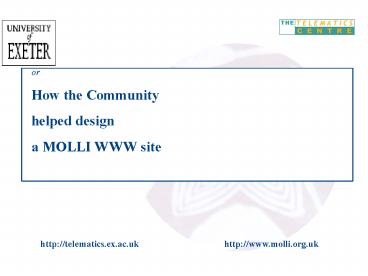Using ICT within the PE curriculum - PowerPoint PPT Presentation
1 / 16
Title:
Using ICT within the PE curriculum
Description:
MOLLI - A Case Study of Formative Evaluation. by focus Group ... http://telematics.ex.ac.uk. http://www.molli.org.uk. Group interviews with target group sample ... – PowerPoint PPT presentation
Number of Views:50
Avg rating:3.0/5.0
Title: Using ICT within the PE curriculum
1
http//telematics.ex.ac.uk
http//www.molli.org.uk
2
What is a focus group?
- Group interviews with target group sample
- Open discussions on topics of interest to
researcher - The topic itself must engage the participants.
(Morgan, 1988) - A form of qualitative research
- a lively conversation among friends
- tape recorded (not videoed), plus paper evidence
http//telematics.ex.ac.uk
http//www.molli.org.uk
3
Focus group pros
- quick, cheap, easy to set up an effective
small-scale survey requiring low budget - opportunity to observe a large amount of
interaction on a topic over a limited period of
time. - permits an open survey that allows researchers
to adopt an openness to alternatives (Krueger,
1997) - generates users spontaneous reactions and
ideas through interaction between participants
(Nielsen, 1993) - complements other data collection methods e.g
questionnaires, interviews, observation
4
Focus group cons
- not natural settings
- do participants say what they think or what they
think you want to hear? - do groups reflect individual opinions or group
behaviour (tribal instinct?)? - may go off track if not managed carefully
- may fail if groups doesnt gell
http//telematics.ex.ac.uk
http//www.molli.org.uk
5
Yoruba Focus Group Procedure
- Focus Group 1 educators
- Context setting
- Visit and intro to Yoruba collection (curator)
- Presentation of artist in residence (ed officer)
- video of Emmanuel Jegede sculpting, poetry
reading, printing
6
Yoruba Focus Group Procedure
- Brainstorm
- Pairs brainstorm to sheet off-line ideas,
on-line ideas - Set time limit 5 mins
7
Yoruba Focus Group Procedure
- Brainstorm
- Pairs brainstorm to sheet off-line ideas,
on-line ideas - Set time limit 5 mins
8
Yoruba Focus Group Procedure
- Selecting ideas stage 1
- Ask pairs to choose up to 10 best ideas put onto
index cards (GS) - Set time limit 10 mins
9
Yoruba Focus Group Procedure
- Selecting ideas stage 1
- Ask pairs to choose up to 10 best ideas put onto
index cards (GS) - Set time limit 10 mins
10
Yoruba Focus Group Procedure
- Selecting ideas stage 3
- Collect cards into packs
- Add in 8 cards with ideas previously generated by
MOLLI ed officer and MOLLI researcher - Go through each card as quickly as possible
getting accept reject or maybe verdicts from
plenary. Join ideas (cards ) together as
requested.
In practice this took longer than the ten minutes
planned, rejected too few ideas (3) but became
the session where ideas were most fully
explored.
11
Yoruba Focus Group Procedure
- Selecting ideas stage 4
- Split back into new pairs
- Pair 1 get on-line deck of cards, pair 2 get
off-line deck of cards - Groups asked to set out cards in a priority
pyramid. i.e. best idea at top next best ideas at
next level and so on. Some recombinations of
ideas took place - Ask groups to add in salt line above which they
would absolutely like to see the ideas be
implemented
12
Yoruba Focus Group Procedure
13
Yoruba Focus Group Procedure
- Focus Group 2 parents
- Nearly identical process (shorter)
- Ideas generated by first focus group added into
- card decks prior to accept/reject sorting
14
Yoruba Focus Group Procedure
- Focus Group 2 parents
15
Yoruba Focus Group Procedure
- Final stage
- Compare results from both groups to determine
- basic content specifications and implement
- draft design of WWW site prior to pilot testing.
16
Yoruba Focus Group Procedure
- References
- Krueger, R. (1998). Analyzing and Reporting Focus
Groups. Thousand Oaks Sage - Morgan, D. (1988). Focus groups as qualitative
research. Sage University Paper Series on
Qualitative Research Methods, Vol. 16.Beverly
Hills Sage - Nielsen, J. (1993). Usability engineering. San
Diego Academic Press































